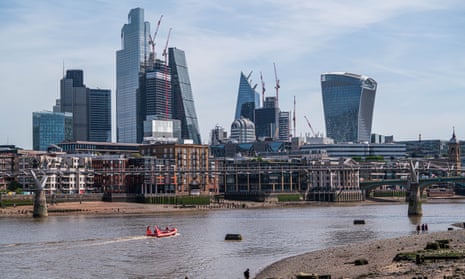Fears are mounting over the health of the UK economy after it unexpectedly shrank in April, as concerns over soaring inflation and slowing global growth triggered a sharp sell-off in financial markets.
In figures highlighting the growing risk of recession, the Office for National Statistics said gross domestic product (GDP) fell by 0.3% on the month, after a 0.1% decline in March. Statisticians said the decline was driven by the winding down of the government’s Covid test-and-trace service, as well as shortages of supplies and soaring costs hitting manufacturing output.
The pound fell by more than 1.5 cents against the dollar, dropping to $1.215 on international currency markets, the lowest since May 2020. Financial markets around the world fell deep into the red on Monday, reflecting concerns over faltering growth as Russia’s war in Ukraine fuels a sharp rise in inflation across economies.
The FTSE 100 index closed down more than 100 points, or about 1.5%, at 7,205, as markets lost ground across Europe. In New York, the S&P 500 fell more than 3% in early afternoon trading, dragging it more than 20% below an all-time high set in January – a decline often defined by City traders as a bear market.
The figures undermine the dilemma facing the Bank of England on Thursday, as Threadneedle Street considers raising interest rates to tackle inflation – at the highest levels in four decades – despite the broad-based economic slowdown.
The ONS said the government scaling-back its Covid vaccination programme and pandemic test-and-trace was the biggest contributor to the monthly fall in GDP. Excluding this effect, the economy probably grew, although analysts warned of weakness elsewhere as shortages of key materials and surging costs weigh on activity.
Monthly GDP “wasn’t as weak as it looks, but it nonetheless increases the chances that the economy is slipping into recession”, said Paul Dales, the chief economist at the consultancy Capital Economics.
City economists had forecast modest growth of 0.1%. Growth over the three-month period to the end of April came close to stalling at 0.2%.
The latest snapshot showed that the three main sectors of the British economy – the service sector, industrial production and construction – shrank for the first time since January 2021 during the nationwide Covid lockdown.
Manufacturing suffered as companies struggled with soaring fuel and energy prices and international supply chain problems, dragging down industrial production by 0.6%. Construction fell 0.4%, after strong growth a month earlier when builders benefited from significant repair activity following storms in February.
Output in consumer-facing services rose 2.6% in the month, reflecting growth in spending on hairdressing and food services. However, the sector remained below pre-pandemic levels in a sign of the significant damage sustained by businesses during shutdowns and restrictions.
The figures come amid growing concern over the strength of the economy as Boris Johnson’s government battles with internal Conservative party divisions over the best way to respond to faltering growth and the rising cost of living.
Rachel Reeves, the shadow chancellor, said the figures would add to concerns over the strength of the economy.
“Instead of properly addressing the structural weaknesses and insecurity they’ve created, all the Conservatives use are sticking plasters,” she said.
Rishi Sunak, the chancellor, said the government had a plan to boost growth and was supporting people with rising living costs. “Countries around the world are seeing slowing growth, and the UK is not immune from these challenges,” he said.
Analysts said the economy was in a stronger position than the figures suggested because of the significant contribution from the NHS test-and-trace service. “If we strip that out, the headline 0.3% decline in monthly GDP should actually have been marginally into growth territory,” said James Smith, an economist at the City bank ING.
The ONS said test-and-trace cut 0.5 percentage points from GDP growth in April as the government scaled back activity, based on estimates for the cost of the services if they were given a market price.
“Just as health-related spending gave the level of GDP an artificial boost last year, helping the economy appear to recover to pre-virus levels more quickly than it actually had, these categories are now making the picture look superficially worse,” Smith added.
However, business leaders warned the overall outlook remained weak as soaring inflation weighs on households and companies, alongside pressure on exporters as the dispute over the Northern Ireland protocol intensifies.
It comes as the Bank of England considers raising interest rates for a fifth time since December, with City economists expecting the base rate to go up from 1% to 1.25% on Thursday. After a record increase in household gas and electricity bills, inflation hit 9% in April, the highest level since 1982.
Raising the spectre of stagflation – whereby weak economic growth is coupled with high inflation – the Bank warned last month that Britain’s economy could slide into recession this year as the cost of living crisis forces households to cut their spending.
Despite concerns over trade as the government sets out legislation to override parts of the protocol, threatening retaliation from Brussels, total exports of goods, excluding precious metals, increased by £2.2bn to the highest inflation-adjusted level since December 2020. Total imports rose by about £400m because of a rise in goods arriving from EU countries.
Barret Kupelian, a senior economist at the accountancy firm PwC, said UK economic output had returned to November levels after the decline in activity over recent months.
“The economic data is now rapidly catching up with the cocktail of challenges businesses and consumers are facing, namely the war in Ukraine, high food and energy inflation and potential for further supply chain disruptions over trade tensions with the EU,” he added.
